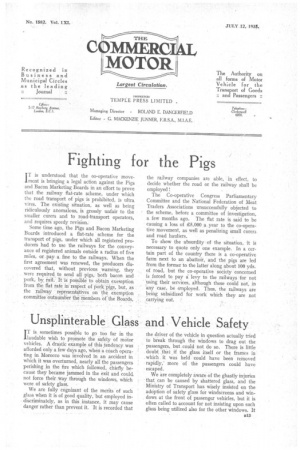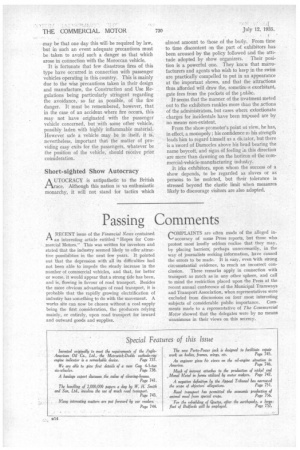Unsphriterable Glass and Vehicle Safety
Page 27

Page 28

If you've noticed an error in this article please click here to report it so we can fix it.
TT is sometimes possible to go too far in the Laudable wish to promote the safety of mOtor vehicles. A drastic example of this tendency was afforded only a few days ago, When a coach operating in Morocco was involved in an accident in which it was overturned, nearly all the passengers perishing in the fire which followed, chiefly, because they became jammed in the exit and could. not force their way through the windows, which were of safety glass. • We are fully cognizant of the merits of such glass when it is of good quality, but employed indiscriminately, as in this instance, it may cause danger rather than prevent it. It is recorded that the driver of the vehicle in question actually tried to break through the windows to drag out the passengers, but. could not do so. There is little doubt that if the glass itself or the frames in . which. it was held could have been removed rapidly; more of the passengers could have escaped.
We are completely aware of the ghastly injuries • that can be caused by shattered glass, and the Ministry of Transport has wisely insisted on the adoption of safety glass for windscreens and windows at the front of passenger vehicles, but it is often called to account for not insisting upon such glass being utilized also for the other windows. It may be that one day this will be required by law, but in such an event adequate precautions must be taken to avoid such a danger as that which arose in connection with the Moroccan vehicle.
It is fortunate that few disastrous fires of this type have occurred in connection with passenger vehicles operating in this country. This is mainly due to the wise precautions taken in their design and manufacture, the Construction and Use Regulations being particularly stringent regarding the avoidance, so far as possible, of the fire danger. It must be remembered, however, that in the case of an accident where fire occurs, this may not have originated with the passenger vehicle concerned, but with some other vehicle, possibly laden with highly inflammable material. However safe a vehicle may be in itself, it is, nevertheless, important that the matter of providing easy exits for the passengers, whatever be the position of the vehicle, should receive prior consideration.
Short-sighted Show Autocracy
AUTOCRACY is antipathetic to the British race. Although this nation is an enthusiastic monarchy, it will not stand for tactics which almost amount to those of the bully. From time to time discontent on the part of exhibitors has been aroused by the policy followed and the attitude adopted by show organizers. Their position is a powerful one. They knew that manufacturers and agents who wish to keep in the swim are practically compelled to put in an appearance at the important shows, and that the attractions thus afforded will draw the, sometini-N exorbitant, gate fees from the pockets of the public.
It-seems that the manner of the treatment meted out to the exhibitors rankles more than the actions of the administrators, but cases where extortionate charges for incidentals have been imposed are by no means non-existent.
From the show-promoter's point oi view, he has, in effect, a monopoly ; his confidence ii, his strength leads him to regard himself as a diklator, but there is a sword of Damocles above his head bearing the name boycott, and signs of feeling in this direction • are more than dawning on the horizon of the commercial-vehicle-manufacturing industiy.
It irks exhibitors, upon whom the success of a show depends, to be regarded as slaves or as persons to be mulcted, but their tolerance is stressed beyond the elastic limit when measures likely to discourage visitors are also adopted.




























































































